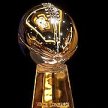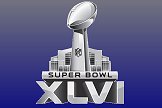
| The Complete Super Bowl |
| Established April 1, 1999 • A Division of Hoffco, Inc. • Not endorsed by the NFL |
| Games • MVPs • Standings • Records • Rings • Programs • Pre-Super Bowl • Sitemap • About |


|
|  |
Two For the Price of One
Under sunny skies and with a 76-degree temperature, the Denver Broncos and the New York Giants played two different Super Bowls. One game, encompassing the first half, was probably the most evenly played matchup of the 21 played. The second game, the second half, was in the tradition of the one-sided blowouts that Super Bowls too often exhibit. Indeed, it may have been the most one-sided yet, other than the Bears' win the year before. Had both teams, and all of the 101,643 in attendance at the Rose Bowl, gone home at intermission, the game would have gone down as the best. Instead, the Giants' complete domination of the second half left only the impression of a terrible mismatch.
On the game's opening drive, Denver went 45 yards in eight plays to set up a Rich Karlis field goal, the key being a 24-yard John Elway-to-Mark Jackson pass. Karlis' barefooted boot from 48 yards matched the longest in Super Bowl history. The Giants came right back to take the lead on a 78-yard drive. Phil Simms, who was 6-for-6 on the drive, hit three crucial passes to account for most of the yardage, and his short toss to Mark Bavaro brought the score to 7-3. Back came Denver. Ken Bell returned the kickoff 28 yards to the Broncos' 42. Elway passed to Orson Mobley and Sammy Winder for a total of 25 yards. Then on a 9-yard screen pass to Winder, Giant linebacker Harry Carson was called for a late hit and, when teammate Lawrence Taylor complained too vociferously, a second penalty was tacked on to put the ball at the six. Three plays later, Elway ran up the middle on a quarterback draw to score.
The Broncos launched another drive as soon as they got the ball back. Elway's 54-yard strike to Vance Johnson was the big play as they stormed to first-and-goal at the one. At last, the vaunted New York defense awoke. On first down, Elway was caught for a two-yard loss on a rollout. Then Gerald Willhite gained nothing up the middle. On third down, Winder lost three around the left end. On the 23-yard field goal try, Karlis set a Super Bowl record-- for the shortest miss. Most observers tagged the four-play goalline stand as the game's turning point. After a couple of first downs by the Giants, Sean Landeta punted to the Denver 15. On third-and-12, Giant defensive end Leonard Marshall sacked Elway for a safety. There was no more scoring in the first half, although Karlis missed again on a 34-yard attempt with 18 seconds left.
The Giants took the second-half kickoff and drove to their own 47 where they faced fourth-and-one. Instead of punting, New York coach Bill Parcells sent in backup quarterback Jeff Rutledge, who ran a sneak for two yards and the first down. New York completed the 63-yard drive with a 13-yard touchdown pass from Simms to Bavaro. Before the quarter ended, the Giants had built their lead to 26-10 on a 21-yard field goal by Raul Allegre and a one-yard touchdown plunge by Joe Morris. A feature of the TD drive was a 44-yard Simms pass to Phil McConkey off a flea-flicker.
The fourth quarter saw two more New York touchdowns, the first for six yards on McConkey's catch of a deflected pass, and the other on a two-yard run by Ottis Anderson. Denver, fighting to the end, saw Karlis connect on a 28-yard field goal, and with just over two minutes remaining, Elway hit Vance Johnson for a 47-yard TD.
Although Elway passed for 304 yards, the Broncos' running game was shut down, with Elway also the leading rusher with 27 yards. Simms was the MVP, completing 22-of-25 passes for a record 88 percent. Also standing out among the many Giant luminaries was linebacker Carl Banks, who had 10 solo tackles.